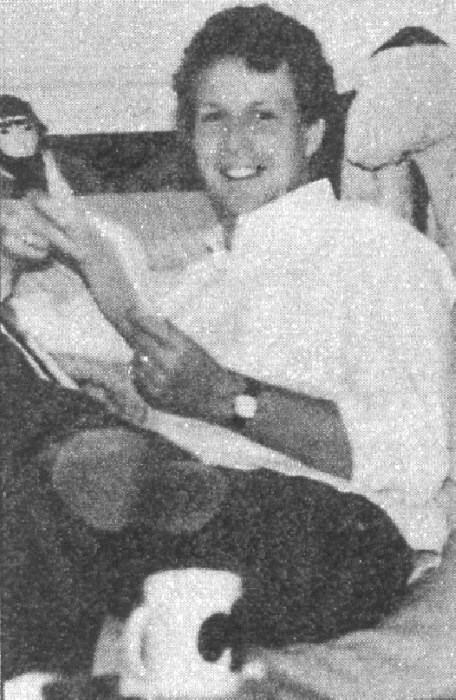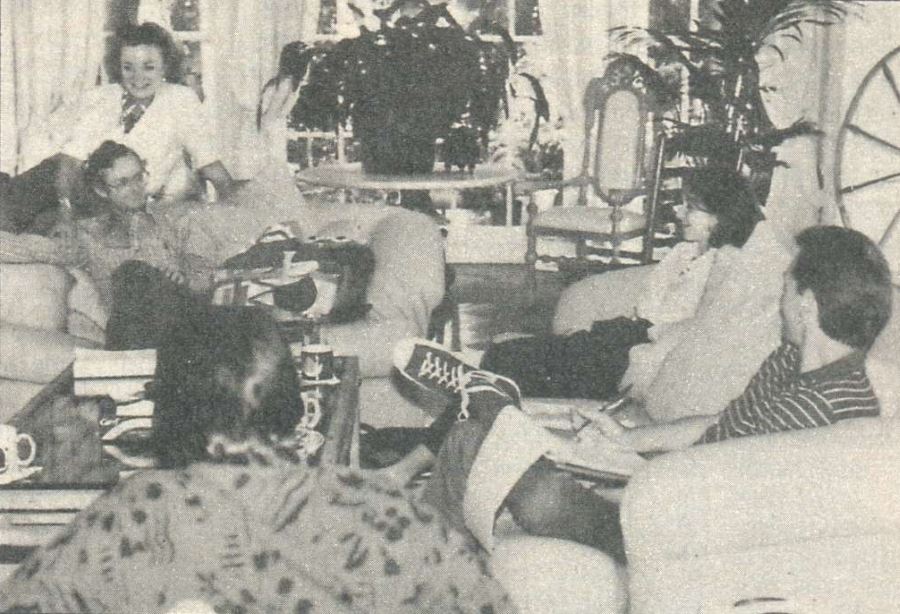Soap Opera Digest, 1986
|
|
Home | Cette page en Franšais |
| Charles Pratt Jr. | |||||
|
Soap Opera Digest, 1986 |
|
||||
 Santa
Barbara's co-head writer, Charles Pratt, Jr., answers these and other
questions about the rigors of writing for a daytime drama.
Santa
Barbara's co-head writer, Charles Pratt, Jr., answers these and other
questions about the rigors of writing for a daytime drama.
How does one get started as a soap writer ?
My advice is, and always has been, to write something else first. Most first time soap writers are hired on the basis of other writing they've done. That would include novels, plays, screenplays... or any other original dramatic writing. What the producers and the networks are looking for are fresh, original approaches that display a ?air for the dramatic. In the case of script writers, we're looking for a command of dialogue writing and an insight into character. I started as a script writer which, in my opinion, is the best place. You learn the correct form and you learn what works and what doesn't.
How much time do you spend writing a week's worth of scripts ?
This will take some arithmetic. There are twenty-four hours a day, 168 hours a week... we produce five hours of scripts a week. We have approximately seven writers working on the show. Each of our seven writers works about 160 hours a week. During our eight hours off, we eat, sleep, pay bills, call our agents, visit our psychiatrists, re-introduce ourselves to our children and spouses... Now then, if each of the seven writers is working 160 hours a week, that adds up to 1120 hours invested in each five hours of shows, or 224 hours per one hour show, and if this is all too confusing, put it this way : we work seven days a week and it's never enough. We eat, drink, sleep and breathe our show.
How far ahead is the rough story outline ? How far ahead are you in terms of scripts ?
Some of our stories are projected as far ahead as a year, but on average, we're thinking ten weeks to six months ahead. Our breakdowns, or outlines, for each individual show are about six weeks ahead. Scripts come in four to three weeks before they're taped. You try to stay as far ahead as possible, but not so far that you get trapped into a story that is not working. We call it a "good bail-out position" - that being about four weeks ahead.
Once you establish a long-term story line, how flexible is it ? How closely do you work with production ?
A story line must remain extremely flexible. If something isn't working you have to be prepared to change it. That means considering the input of the viewers, the producers, the directors and the actors. In fact, most soap writers try to keep a projected story as loose as they can, leaving room for further twists and turns. When a story is working, you want to get as much juice out of it as you can. Most of our contact with production comes through scripts and breakdowns. They tell us what they can and cannot do. Production obviously relies heavily on the writing team and vice versa. It's sort of like a partnership, or better yet, a marriage. Each side has to give a little to make things work. And though, occasionally, divorce is discussed, both sides realize they'd be nothing without the other.
Do you really consider the actors' opinions about their characters ?
Only if they're attractive and female - and know the right persuasive techniques. Seriously, the writers always welcome input by the actors but, unfortunately, the actors don't always have the most objective viewpoints about their characters. But a good writing team always listens. That's the key. A lot of ideas are coming at you from all sides. You try to take it all in, then rely on your gut instinct for the final decision. Writers talk a lot about their guts - because truly that's where our talent lies - the ability to distinguish between what is good and what is bad.
How much does viewer input really matter ?
No writer lives in a vacuum. We are all, ultimately, slaves to our viewers. While we write to please ourselves, none of it matters if we're not pleasing our audience. Their opinions and input are invaluable. Mostly, we're interested in their likes and dislikes. You have to take everything an audience says with a grain of salt because if they're involved in the story, their opinions will be very personal and strong and full of emotion. I've always thought the major responsibility of a writer is to keep his viewer either on the edge of his seat, or laughing, or crying, or swearing, or caring. The point is, you can never let them get bored. If a viewer is bored, I'm not doing my job.
Are you ever tempted to use experiences from your own personal life in your stories ?
Constantly. This is one of the really fun aspects of writing. To insert, modify and adapt your own life into the drama. For example, my wedding night. My wife Barbara and I... wait a second, I can't tell that story. We couldn't on the air, either. Unfortunately, this is too bizarre to translate to television. The best stories come from a hybrid blend of imagination, real life and dreams. You'd be surprised how many good stories can come out of a night of fitful sleep. Perhaps this is why you'll find so many dream sequences on Santa Barbara.
Who decides when to bring on a new character ? What are the considerations ?
No one person on an hour drama can call all the shots and make all decisions. It is a group effort. Though most of the characters and stories originate with the writers, the final decisions are made by a group consisting of the writers, producers and network executives. From a creative point of view, you don't want to bring in too many new characters all at once. Usually they're brought in for specific story reasons. Introducing that new character is probably the most important consideration. How will he/she appear ? What will he/she do in his first few shows ? Who are his/her friends ? What does he/she want ? Then you've got to find the right actor - which is a whole other problem.
 Are
there ever story disagreements ? How are they resolved ?
Are
there ever story disagreements ? How are they resolved ?
"Yes" to the first question. "No comment" to the second. Seriously, if we all agreed all the time, it'd be a pretty boring show. Though we've never come to blows, we've come close. Writers get very passionate about their work. If they like something and know in their gut it works, they'll go to great lengths to defend it. The more passionate their belief, the more childish their behavior. Personally, I've been known to make threats... from showing up on people's front porches with boxing gloves to quitting and going to work for Divorce Court. Ultimately, compromise is the best solution. With patience and an objective viewpoint, the worst disagreements can usually be resolved. On the other hand, ironically, the harder a writer fights, the more respect he gets.
Do you ever run out of story ideas ?
Eight times a week.
What do you do ?
Panic.
Then what do you do ?
Look at a pile of bills. As they say, necessity is the mother of invention.
Why would anyone want to write for a soap opera ?
To avoid reality.
Really ?
Most of us don't have a choice. It's either write or go to ditch digging school. Writing is like a compulsion, like nail biting or smoking. Once it's with you, it's hard to get rid of.
Read also : The galley of romance